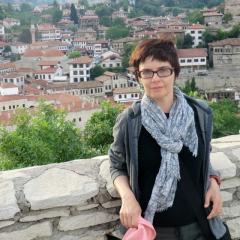SESYNC Welcomes Professor Julie Silva as a new Sabbatical Fellow
The National Socio-Environmental Synthesis Center (SESYNC) is pleased to welcome Professor Julie Silva as a Sabbatical Fellow for the 2017 academic year.
Julie joins us from the University of Maryland, College Park, where she is Associate Professor in Geography, specializing in economic and development geography with a regional emphasis in sub-Saharan Africa. Julie’s research focuses on poverty and inequality, and the intersection of human and physical geography.

She has a strong interest in encouraging interdisciplinary thinking, in part because her research is interdisciplinary, and also because Julie’s path to geography was somewhat unconventional.
Julie’s interest in social science and geography began while she was in the Peace Corps in rural Gabon. Julie majored in English literature and poetry for her undergraduate, but as she taught English for two years in a rural, forested area of Gabon, she became interested with how people interacted and were reliant on forests and natural resources. After the Peace Corps, Julie went back to college at Rutgers University for City and Regional Planning, and later got her Ph.D. in Geography.
As African countries become more integrated in the global market, Julie has been studying how different villages benefit (or don’t benefit) from these changes. Her research has focused on the socio-economic drivers of poverty in rural and forested areas in Mozambique and Namibia.
“I developed a special place in my heart for the people I worked and lived with in Gabon, and now my work is motivated by the desire to help improve living standards and enhance social justice in economically marginalized regions,” Julie said.
The United Nations and environmental NGOs are interested in ways to help African countries improve living standards and develop sustainably. Julie’s research, which includes surveys and interviews of people in sub-Saharan Africa, can help decision makers understand the economic motivations of people in her study area. She also studies how different communities in Africa, especially smallholder farmers, may be more vulnerable to climate change.
“I was really excited to learn that it would be possible to do a sabbatical at SESYNC,” Julie said. “I think a lot of great collaborations come out of informal interactions with people from different disciplines and I’m looking forward to meeting and working with scholars here."
Her research here at SESYNC will bring together almost a decade of qualitative socio-economic and biophysical data collected in Namibia and Mozambique. Julie is working on compiling this data and making it publically available so that she can work collaboratively to combine it with other datasets and remotely sensed imagery.
Julie lives here in Annapolis and has been a Professor at the University of Maryland since 2010. Julie’s work has been supported by a variety of federal grants, including a National Science Foundation Faculty Early Career Development Award and a NSF Dynamic Coupled Natural and Human Systems Interdisciplinary Team Exploratory Project Award.
To learn more about Julie's research, check out her UMD webpage.